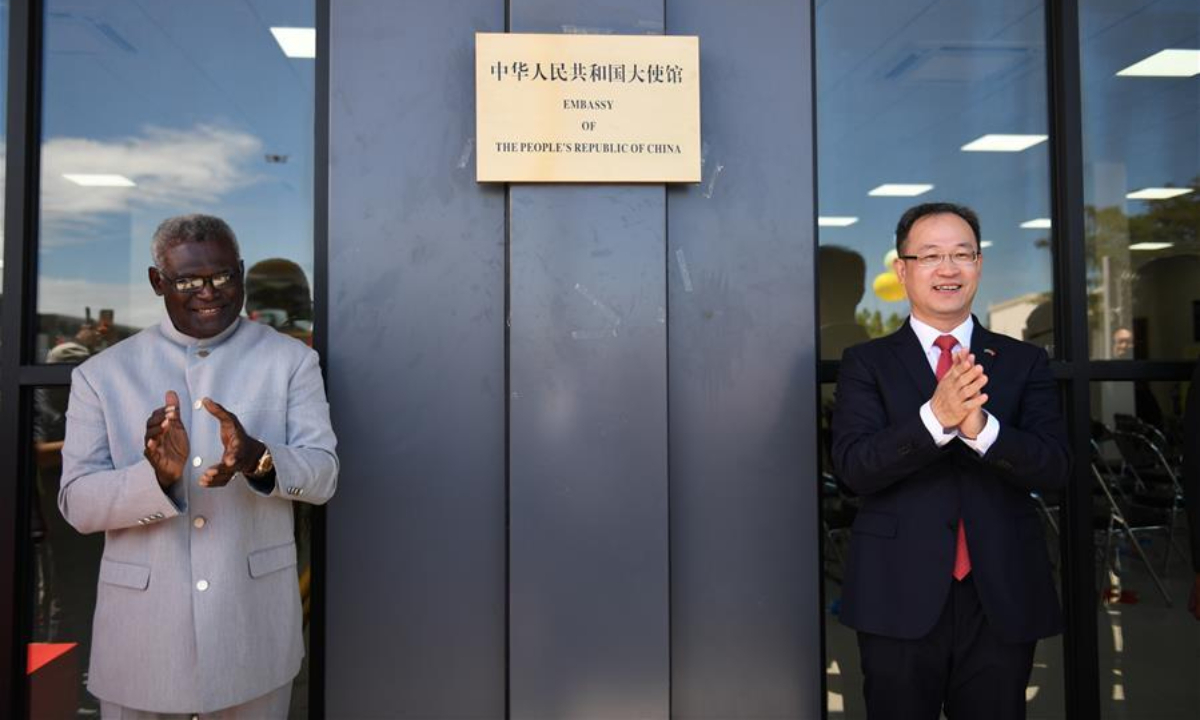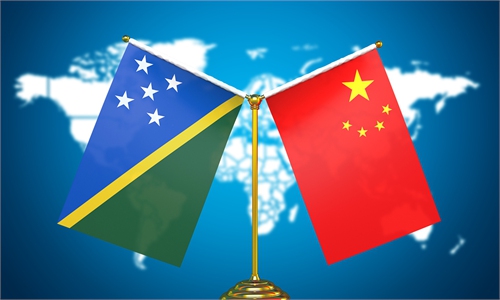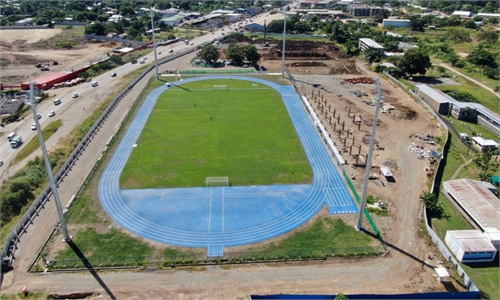Australian media hype ‘ban’ on journalists entering Solomon Islands to maliciously sabotage cooperation with China

Chinese Ambassador to the Solomon Islands Li Ming (R) and the Solomon Islands Prime Minister Manasseh Sogavare attend the opening ceremony of Chinese Embassy in the Solomon Islands, in Honiara, capital of the Solomon Islands, Sep 21, 2020. Photo:Xinhua
By hyping the topic of foreign journalists being "banned" from entering the Solomon Islands for "attacking" the country's relations with China, the Australian Broadcasting Corp (ABC) wants to portray itself as a victim to further smear China and the Solomon Islands' government, analysts said, noting that Australia's mainstream media have formed "an assembly line" with their government, think tanks, Western media and the US in making and spreading disinformation to demonize normal cooperation between China and Pacific nations and to maintain the US' and its deputy sheriff's hegemony in the region.
On Thursday, the ABC released a report claiming that the Solomon Islands' government "has seemingly confirmed it will block foreign journalists" from entering the country by citing an "extraordinary" and "lengthy" statement from the office of Prime Minister Manasseh Sogavare that accused the Australian broadcaster and the program Four Corners of the intentional use of misinformation and distribution of "pre-conceived prejudicial information."
As the Solomon Islands' government and the PM's office had not released the statement on their official websites as of press time, all the contents of the statement were from the ABC's report, and analysts said that it was the ABC itself that interpreted the statement as "confirmation" to ban "foreign journalists" with the purpose of further smearing the Solomon Islands' government and its cooperation with China.
The PM office's statement released by the ABC said that the government will ensure that racial practices and radical discrimination are eliminated from the country and "organizations or journalists who process such qualities will not be allowed to enter the Solomon Islands and other Pacific Islands nations."
ABC wants to portray itself as a victim by hyping the so-called ban on foreign journalists entering the Solomon Islands. It can further demonize China and the Solomon Islands' government for restricting adverse reports on bilateral cooperation or "controlling" public opinion, Chen Hong, president of the Chinese Association of Australian Studies and director of the Australian Studies Centre at East China Normal University, told the Global Times.
Even if the Solomon Islands' government bans ABC reporters from entering the country, it is justified and understandable, given the broadcaster's biased and unprofessional reports especially toward the Solomon Islands government's cooperation with China, Chen said.
On Tuesday, the Solomon Islands' government released a statement to refute the ABC's Four Corners Program's disinformation on a Chinese firm that was reportedly planning to buy Kolombangara Forests Products Ltd on Kolombangara Island. It pointed out that the ABC has intentionally used misinformation and distributed "pre-conceived prejudicial information" and such information "is also racial profiling that is bordering on racism and race stereotyping."
Four Corners, a show of the ABC, released written and video reports on August 1, in which it claimed that state-owned China Forestry Group Corp (CFGC) was in negotiations to buy a hardwood forestry plantation on Kolombangara island. Although the company denied the claim, the ABC kept hyping the topic and cited "scholars" to say China may have an interest in turning ports in the Solomon Islands into those for military use, and it interviewed "local residents" and politicians from the opposition party to show "concern" over cooperation with China.
Chen, who watched the Four Corners program, criticized the reports for their malicious purpose. "It is pre-setting a political stance and guiding carefully selected interviewees who may bear hostility toward the current Solomon Islands' government, to 'express' concerns over China."
China and the island nation's cooperation seemed to raise the ire of Australia, which has always regarded the Pacific island region as its domain, and the signing of a bilateral security deal in April by China and the Solomon Islands was like shooting a gun for the Australian government and media to speed up slandering China and distorting its intentions in cooperating with Pacific nations, analysts said.
For example, in April, the ABC, news.com.au and other Australian media hyped "leaked" documents and claimed that China required Australia to send a security team to the Solomon Islands and even planned to build a naval base.
Chen said that given the increasing anti-China sentiment in Australia, Australia's mainstream media have actively participated in making negative "news" about China and its cooperation with Pacific nations, especially the ABC.
The expert pointed out that "it seems to have become an assembly line in making such reports - the Australian intelligence agency feeds 'clues' to Australian media, their employees - most of whom are between 30 and 40 years old and in need of career progress -- try to dig up 'dirty' stories on China, anti-China scholars and think tanks come out to contribute quotes … then more Western media outside Australia help to further spread these sensational and biased 'reports.'"
Echoing Chen's remarks, since Thursday, mainstream Western media, including the Guardian and Bloomberg, retold the ABC's reports on the Solomon Islands' "ban" on foreign reporters. Moreover, on Thursday, a Reuters report claimed that the Solomon Islands' PM's office had distributed Chinese government money to parliament members and raised questions.
On Friday, Reuters also reported that a US Coast Guard vessel was unable to enter the Solomon Islands for a routine call, and the report noted that the Solomon Islands' government had a tense relationship with the US and its allies since it signed the security pact with China.
Analysts lashed out, saying that these reports were made to fuel a fire to burn the Solomon Islands' government and China and further slander their normal cooperation. It is the US and Australia that are keen to maintain hegemony in the region to exclude China's presence in the South Pacific and they have ramped up efforts to frame China with dirty tricks.




